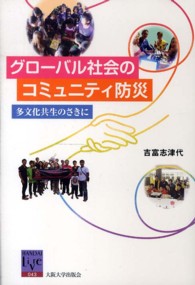Full Description
Discover the rhetorically based writing guide designed for you, the digital native, with THE NEW HARBRACE GUIDE: GENRES FOR COMPOSING, 4E. This reader-friendly presentation, written by award-winning author Cheryl Glenn, is known for its trademark emphasis on writing in multiple media. This edition combines coverage of genres and persuasion with a thematic reader, research manual, and a new, rhetorically-oriented handbook section that offers step-by-step guidance in editing. Thirty-six new readings jumpstart your writing with interesting topics ranging from veganism and apolitical food to how young people are changing today's climate conversation. Updated content guides you in analyzing rhetorical choices, creating effective thesis statements, and applying the latest MLA or APA styles. With this edition and MindTap online tools, you can sharpen your digital, print, and multimodal composing skills as well as strengthen critical thinking that is invaluable in future courses and your career.
Contents
Preface
PART I: ENTERING THE CONVERSATION: THE RHETORICAL SITUATION.
1. Understanding the Rhetorical Situation.
Rhetoric Surrounds Us. Finding an Opportunity for Change. The Decision to Engage. "The Force Awakens". Analyzing the Elements of the Rhetorical Situation. Thinking Rhetorically About Purpose and Audience. Thinking Rhetorically About Genre and Media. Assignment: Rhetorical Opportunities. Michael Bérubé, "Life as We Know It".
2. Responding to the Rhetorical Situation.
Thinking Rhetorically About Persuasion. A Problem-Solving Approach. Making Claims. Using the Available Means of Persuasion. Malala Yousafzai, Blog Entries [I Am Afraid], [Interrupted Sleep]. Sojourner Truth, "Ain't I a Woman". The Amethyst Initiative, "It's Time to Rethink the Drinking Age". Resources and Constraints. Assignment: A Rhetorical Analysis.
3. The Writer as Reader.
Reading Strategies. Barry M. Prizant, "Uniquely Human: A Different Way of Seeing Autism [Animated Movies and Summary]". Summary. Critical Response. Analysis and Synthesis.
Jordynn Jack, Autism and Gender: From Refrigerator Mothers to Computer Geeks ["Savants" and "Geniuses"]. Assignment: The Synthesis (or Research) Essay.
4. Rhetorical Success in a Digital World.
Thinking Rhetorically About Multimedia Texts. Callout Card for Family Violence Prevention. Designing Multimedia Texts to Persuade. Pink Ribbon Website (annotated). Santa Fe Travel Website. How Images Tell a Story. Infographics. War Resisters League, "Where Your Income Tax Money Really Goes" (infographic). Considering Audience, Purpose, and Accessibility in Multimedia Compositions. NOAA, "Protecting Our Planet Begins with You". The Brazos Gumbo Facebook Page. ViziGoGo Webpage. Caladenia Addams, YouTube: Bad Questions to Ask a Transsexual. Grace Randolph, YouTube: Concussion Movie Review. Carmine Gallo, Five Basic Elements in Every Steve Jobs Presentation. Assignment: Analyzing Images. Nike "Test Your Faith Daily" (advertisement).
PART II: WRITING PROJECTS: RHETORICAL SITUATIONS FOR COMPOSING.
5. Memoirs.
Genre in Focus: The Food Memoir. Reading Rhetorically. Key Features of a Memoir. Anna Seitz, "Herb's Chicken" (annotated). Using Synthesis and Analysis. Responding to the Rhetorical Situation. Understanding the Rhetorical Situation. Writing a Persuasive Memoir: A Guide. Advantages and Limitations of a Memoir. Revision and Peer Review. Additional Assignments: Knowledge Transfer. Grammar in Context: Thinking Rhetorically about Verb Tense.
6. Profiles.
Genre in Focus: The Bio. Reading Rhetorically. Key Features of a Profile. Sandra Sobieraj Westfall et al., "Heroes on the Train: 'It Was Either Do Something or Die'" (annotated). Using Synthesis and Analysis. Responding to the Rhetorical Situation. Understanding the Rhetorical Situation. Writing a Persuasive Profile: A Guide. Advantages and Limitations of a Profile. Revision and Peer Review. Additional Assignments: Knowledge Transfer. Grammar in Context: Thinking Rhetorically about Inclusive Language.
7. Investigative Reports.
Genre in Focus: The Explainer Report. Reading Rhetorically. Key Features of an Investigative Report. Christina Rosen, "The Myth of Multitasking" (annotated). Using Synthesis and Analysis.
Responding to the Rhetorical Situation. Understanding the Rhetorical Situation. Writing a Persuasive Investigative Report: A Guide. Advantages and Limitations of an Investigative Report. Revision and Peer Review. Additional Assignments: Knowledge Transfer. Grammar in Context: Thinking Rhetorically about Attributive Tags.
8. Position Arguments.
Genre in Focus: The Commentary.
Reading Rhetorically.
Key Features of a Position Argument.
Alicia Williams, "The Ethos of American Sign Language" (annotated).
Using Synthesis and Analysis.
Responding to the Rhetorical Situation. Understanding the Rhetorical Situation.
Writing a Persuasive Position Argument: A Guide.
Advantages and Limitations of a Position Argument.
Revision and Peer Review.
Additional Assignments: Knowledge Transfer



![椅子と身体 - 椅子とは何か? [テキスト]](../images/goods/ar2/web/imgdata2/49052/4905239842.jpg)



